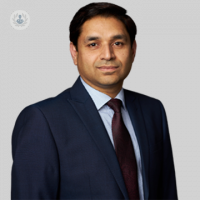Understanding your heart: Insights on mitral valve care
Written in association with:In his latest online article, Mr Vivek Srivastava gives us his insights into the Mitral Valve. He talks about the common issues, the impact of a malfunctioning mitral valve, treating mitral valve issues, mitral valve surgery and treatment options.

Understanding the Mitral Valve
The human heart features four vital valves that facilitate the unidirectional flow of blood while preventing its backflow—a role similar to valves used in plumbing systems. Situated on the left side of the heart, between the lungs and the heart itself, the mitral valve plays a crucial role. Positioned between the chamber receiving oxygenated blood from the lungs and the primary pumping chamber of the heart, the mitral valve opens to facilitate unimpeded blood flow from the lungs into the pumping chamber and closes to prevent the backward flow of blood towards the lungs.
Common Mitral Valve issues
Typically composed of two flaps, the mitral valve generally performs its function seamlessly throughout a person's life. However, some individuals may experience issues with the mitral valve for reasons that remain unclear. In developed regions, degenerative changes due to aging often contribute to valve problems, resulting in blood leakage towards the lungs. Additionally, calcium and scar deposits on the valve may cause stiffness, potentially obstructing the valve. Infections can also lead to valve malfunction.
Impact of a malfunctioning Mitral Valve
A faulty mitral valve, whether leaking or obstructed, can adversely affect heart function, potentially impacting the lungs and overall well-being. Symptoms may arise, affecting exercise tolerance and quality of life. In advanced stages, complications may extend to other cardiac components, such as the right-sided Tricuspid valve, and may cause rhythm irregularities. Left untreated, these complications can negatively influence life expectancy.
Treating Mitral Valve issues
The discovery of an abnormal mitral valve, often incidentally, doesn't always necessitate immediate intervention. In the early stages, the heart can manage reasonably well, and symptoms may not be evident. Regular follow-ups are recommended, and medications may be prescribed to help the heart cope with the effects of the diseased mitral valve. However, when symptoms emerge or heart function is compromised due to significant leakage or obstruction, more decisive action is required. Traditionally, surgery has been the primary recourse, but recent years have seen the emergence of alternative treatments. The choice between repair and replacement depends on the extent of damage to the mitral valve.
Mitral Valve surgery: Repair or replacement?
Repairing the mitral valve is often favoured when feasible, given the advantages of retaining one's natural valve. While repair can be technically challenging, surgeons specialising in mitral valve surgery undergo focused training. If repair is not possible or unsuccessful, replacing the valve with an artificial one becomes necessary.
Exploring treatment options
Beyond surgery, cardiology procedures provide alternatives for mitral valve issues. Balloon procedures can address narrowed valves, and recent innovations offer solutions for leaking valves. However, these options are not universally applicable, and individualised treatment plans are essential based on the specific condition and patient factors. Consulting with a heart surgeon can provide a more detailed understanding of available options
Mr Vivek Srivastava is an esteemed cardiothoracic surgeon. You can schedule an appointment with Mr Srivastava on his Top Doctors profile


